1. 学习计划
1、solr集群搭建
2、使用solrj管理solr集群
3、把搜索功能切换到集群版
2. 什么是SolrCloud
SolrCloud(solr 云)是Solr提供的分布式搜索方案,当你需要大规模,容错,分布式索引和检索能力时使用 SolrCloud。当一个系统的索引数据量少的时候是不需要使用SolrCloud的,当索引量很大,搜索请求并发很高,这时需要使用SolrCloud来满足这些需求。
SolrCloud是基于Solr和Zookeeper的分布式搜索方案,它的主要思想是使用Zookeeper作为集群的配置信息中心。
它有几个特色功能:
1)集中式的配置信息
2)自动容错
3)近实时搜索
4)查询时自动负载均衡
3. Solr集群的系统架构
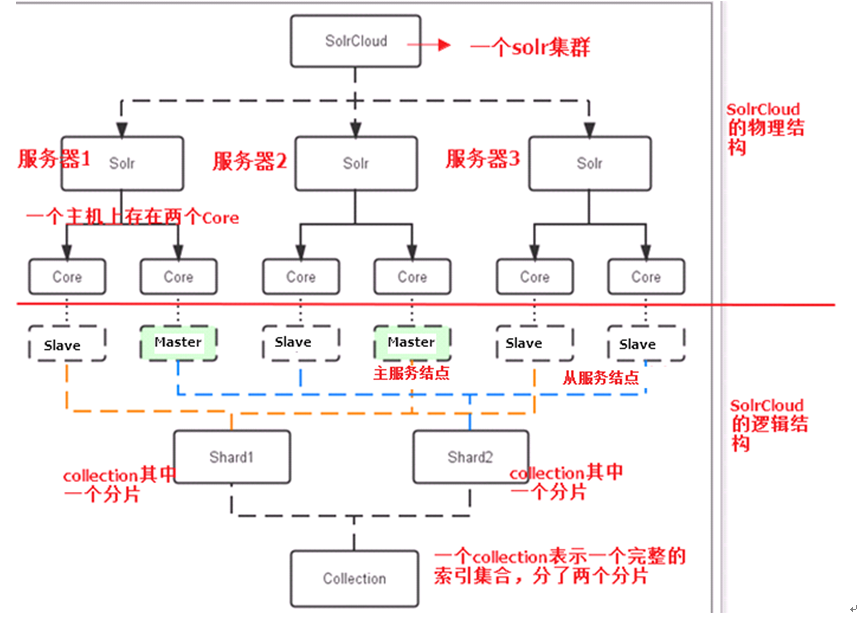
3.1. 物理结构
三个Solr实例( 每个实例包括两个Core,不一定必须是两个实例Core),组成一个SolrCloud。
3.2. 逻辑结构
索引集合 collection 包括两个分片 Shard(shard1和shard2),shard1 和shard2 分别由三个 Core 组成,其中一个Leader两个Replication,Leader是由zookeeper选举产生,zookeeper控制每个shard上三个Core的索引数据一致,解决高可用问题。
用户发起索引请求分别从shard1和shard2上获取,解决高并发问题。
3.2.1. collection
Collection在SolrCloud集群中是一个逻辑意义上的完整的索引结构。它常常被划分为一个或多个Shard(分片),它们使用相同的配置信息。
比如:针对商品信息搜索可以创建一个collection。
collection=shard1+shard2+....+shardX
3.2.2. Core
每个Core是Solr中一个独立运行单位,提供 索引和搜索服务。一个shard需要由一个Core或多个Core组成。由于collection由多个shard组成所以collection一般由多个core组成。
3.2.3. Master或Slave
Master是master-slave结构中的主结点(通常说主服务器),Slave是master-slave结构中的从结点(通常说从服务器或备服务器)。同一个Shard下master和slave存储的数据是一致的,这是为了达到高可用目的。
3.2.4. Shard
Collection的逻辑分片。每个Shard被化成一个或者多个replication,通过选举确定哪个是Leader。
3.3. 需要实现的solr集群架构
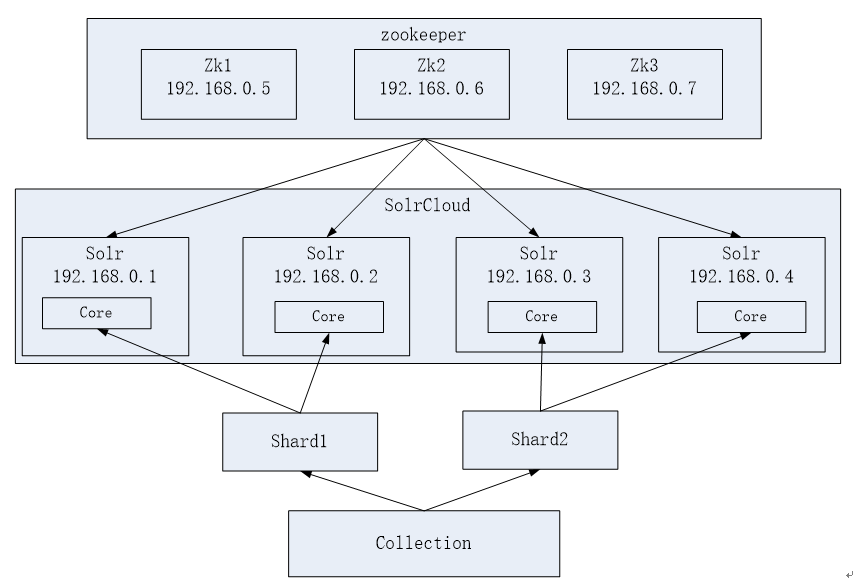
Zookeeper作为集群的管理工具。
1、集群管理:容错、负载均衡。
2、配置文件的集中管理
3、集群的入口
需要实现zookeeper 高可用。需要搭建集群。建议是奇数节点。需要三个zookeeper服务器。
搭建solr集群需要7台服务器。
搭建伪分布式:
需要三个zookeeper节点
需要四个tomcat节点。
建议虚拟机的内容1G以上。
4. 环境准备
CentOS-6.5-i386-bin-DVD1.iso
jdk-7u72-linux-i586.tar.gz
apache-tomcat-7.0.47.tar.gz
zookeeper-3.4.6.tar.gz
solr-4.10.3.tgz
5. 安装步骤
5.1. Zookeeper集群搭建
第一步:需要安装jdk环境。
第二步:把zookeeper的压缩包上传到服务器。
第三步:解压缩。
第四步:把zookeeper复制三份。
[root@localhost ~]# mkdir /usr/local/solr-cloud [root@localhost ~]# cp -r zookeeper-3.4.6 /usr/local/solr-cloud/zookeeper01 [root@localhost ~]# cp -r zookeeper-3.4.6 /usr/local/solr-cloud/zookeeper02 [root@localhost ~]# cp -r zookeeper-3.4.6 /usr/local/solr-cloud/zookeeper03
5.1.1. 创建Zookeeper标识myid
第五步:在每个zookeeper目录下创建一个data目录。
第六步:在data目录下创建一个myid文件,文件名就叫做“myid”。内容就是每个实例的id。例如1、2、3
[root@localhost data]# echo 1 >> myid [root@localhost data]# ll total 4 -rw-r--r--. 1 root root 2 Apr 7 18:23 myid [root@localhost data]# cat myid 1
5.1.2. 修改zoo.cfg,Zookeeper互联
第七步:修改配置文件。把conf目录下的zoo_sample.cfg文件改名为zoo.cfg
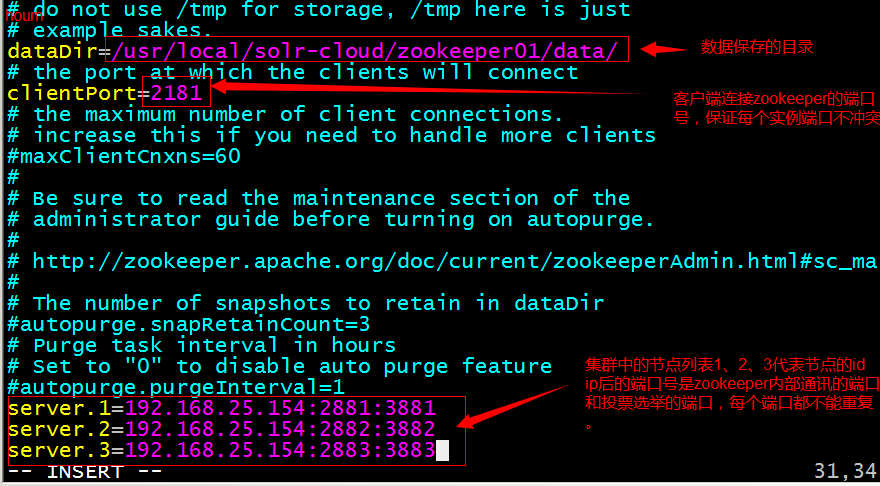
2881是Zookeeper集群的默认的通信端口,3881是Zookeeper默认的选举端口
server.1=192.168.25.154:2881:3881 server.2=192.168.25.154:2882:3882 server.3=192.168.25.154:2883:3883
第八步:启动每个zookeeper实例。
启动:bin/zkServer.sh start
查看zookeeper的状态:
查看:bin/zkServer.sh status
5.2. Solr集群的搭建
solr集群配置的两点关键:
1、配置集群中各个solr项目之间的互联 — solrHome 下的 solr.xml
2、配置solr(tomcat)和Zookeeper的关联 — tomcat/bin/catalina.sh
— Zookeeper集中管理配置文件
5.2.1. 部署Solr
第一步:创建四个tomcat实例。每个tomcat运行在不同的端口,8180、8280、8380、8480,需要修改tomcat的配置文件。
第二步:部署solr的war包。把单机版的solr工程复制到集群中的tomcat中。
5.2.2. 关联solrHome
第三步:为每个solr实例创建一个对应的solrhome(不太严谨,严谨来讲,为每个solr项目创建对应的solrHom,一个solrHome下可以有多个solr实例—solrCore)。使用单机版的solrhome复制四份。
第四步:需要修改solr的web.xml文件。把solrhome和solr项目关联起来。
5.2.3. 配置solrCloud,集群模式
第五步:配置solrCloud相关的配置。每个solrhome下都有一个solr.xml,把其中各个部署的solr项目的ip及端口号配置好。

5.2.4. 上传配置文件到Zookeeper
第六步:让zookeeper统一管理配置文件。需要把solrhome/collection1/conf目录上传到zookeeper。上传任意solrhome中的配置文件即可。
使用工具上传配置文件:/root/solr-4.10.3/example/scripts/cloud-scripts/zkcli.sh
./zkcli.sh -zkhost 192.168.25.154:2181,192.168.25.154:2182,192.168.25.154:2183 -cmd upconfig -confdir /usr/local/solr-cloud/solrhome01/collection1/conf -confname myconf
|
./zkcli.sh -zkhost 192.168.25.154:2181,192.168.25.154:2182,192.168.25.154:2183 -cmd upconfig -confdir /usr/local/solr-cloud/solrhome01/collection1/conf -confname myconf |
查看zookeeper上的配置文件:
使用zookeeper目录下的bin/zkCli.sh命令查看zookeeper上的配置文件:
[root@localhost bin]# ./zkCli.sh [zk: localhost:2181(CONNECTED) 0] ls / [configs, zookeeper] [zk: localhost:2181(CONNECTED) 1] ls /configs [myconf] [zk: localhost:2181(CONNECTED) 2] ls /configs/myconf [admin-extra.menu-top.html, currency.xml, protwords.txt, mapping-FoldToASCII.txt, _schema_analysis_synonyms_english.json, _rest_managed.json, solrconfig.xml, _schema_analysis_stopwords_english.json, stopwords.txt, lang, spellings.txt, mapping-ISOLatin1Accent.txt, admin-extra.html, xslt, synonyms.txt, scripts.conf, update-script.js, velocity, elevate.xml, admin-extra.menu-bottom.html, clustering, schema.xml] [zk: localhost:2181(CONNECTED) 3]
退出:
[zk: localhost:2181(CONNECTED) 3] quit
5.2.5. 关联solr(tomcat)和Zookeeper
第七步:修改tomcat/bin目录下的catalina.sh 文件,关联solr和zookeeper。
把此配置添加到配置文件中:
JAVA_OPTS="-DzkHost=192.168.25.154:2181,192.168.25.154:2182,192.168.25.154:2183"

第八步:启动每个tomcat实例。要保证zookeeper集群是启动状态。
第九步:访问集群
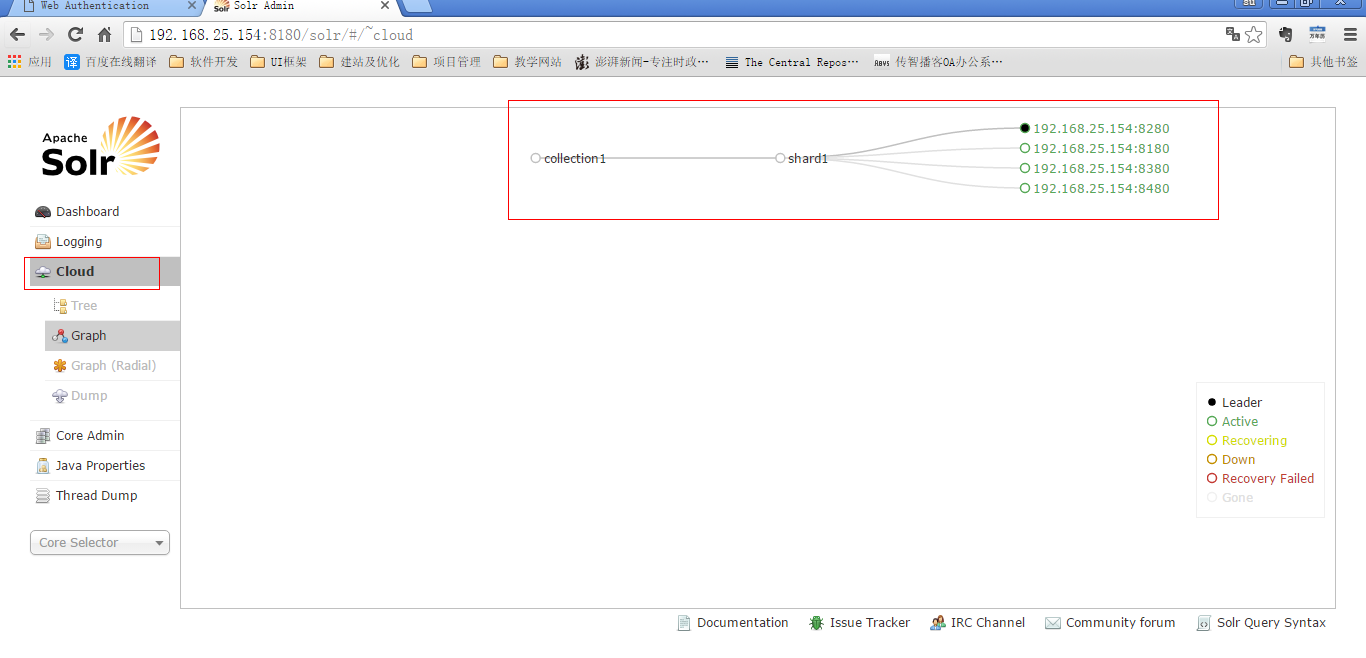
5.2.6. 分片操作
第十步:创建新的Collection进行分片处理。
http://192.168.25.154:8180/solr/admin/collections?action=CREATE&name=collection2&numShards=2&replicationFactor=2
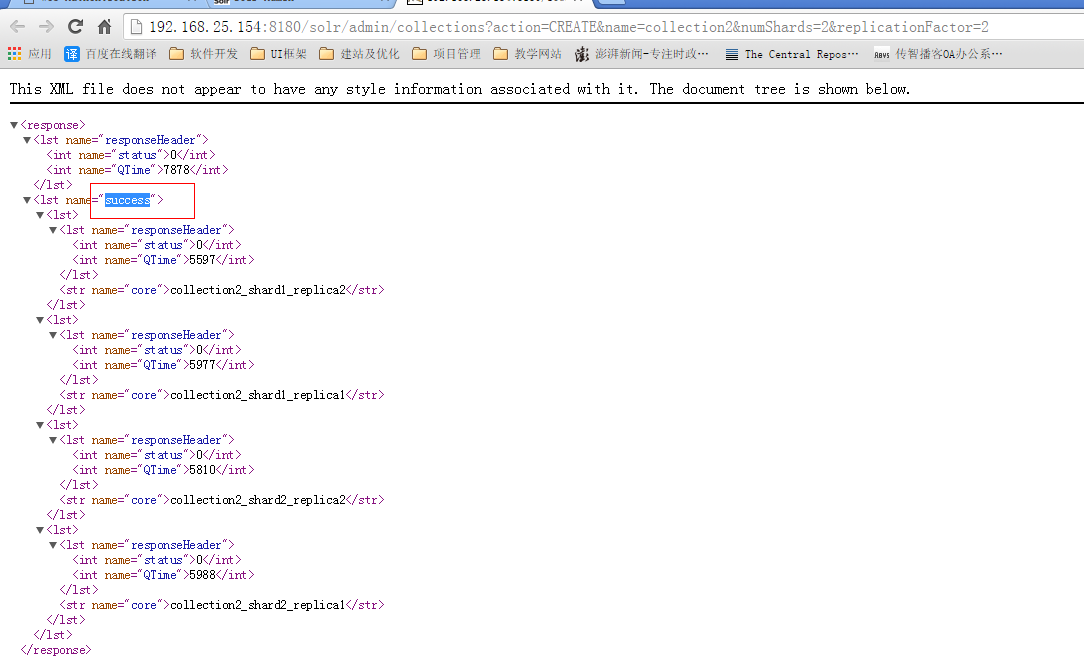
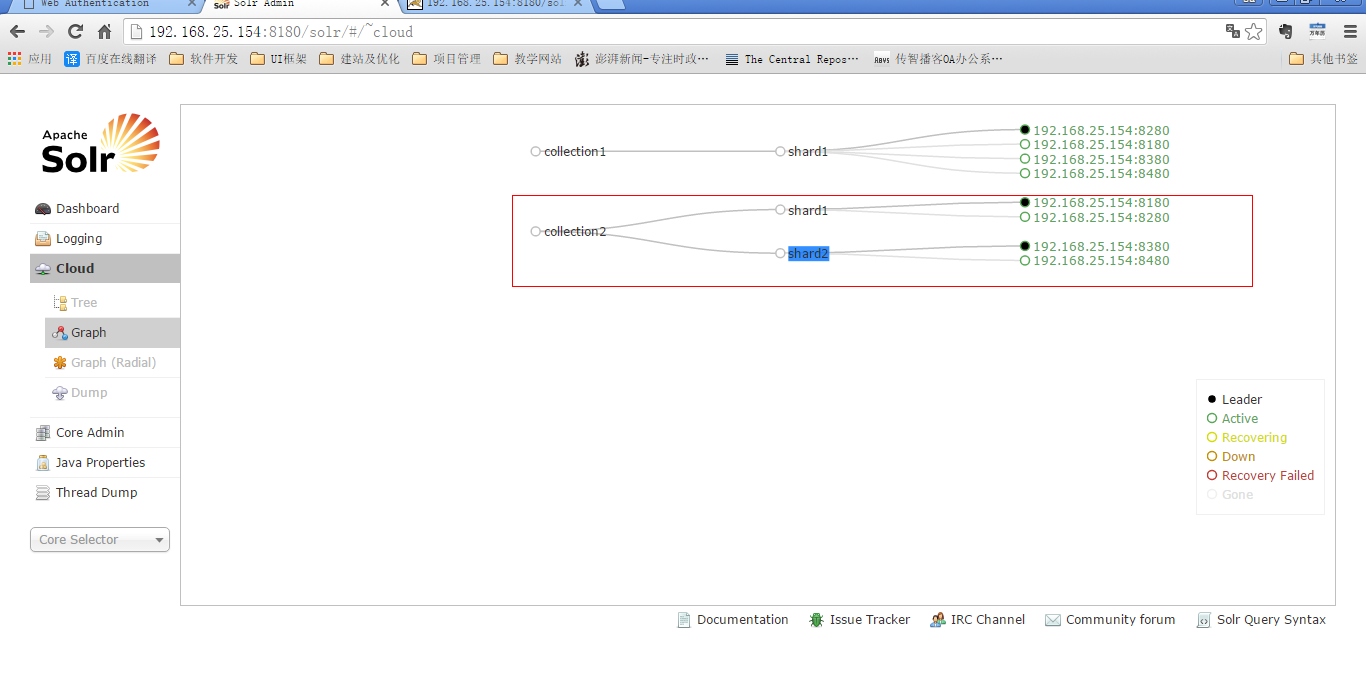
第十一步:删除不用的Collection。
http://192.168.25.154:8180/solr/admin/collections?action=DELETE&name=collection1
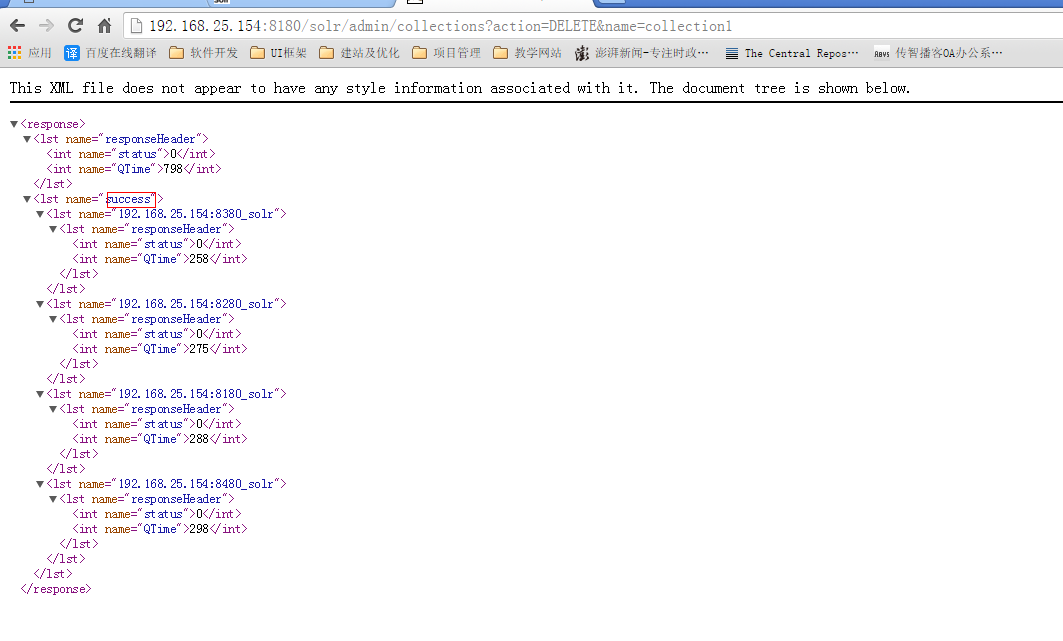
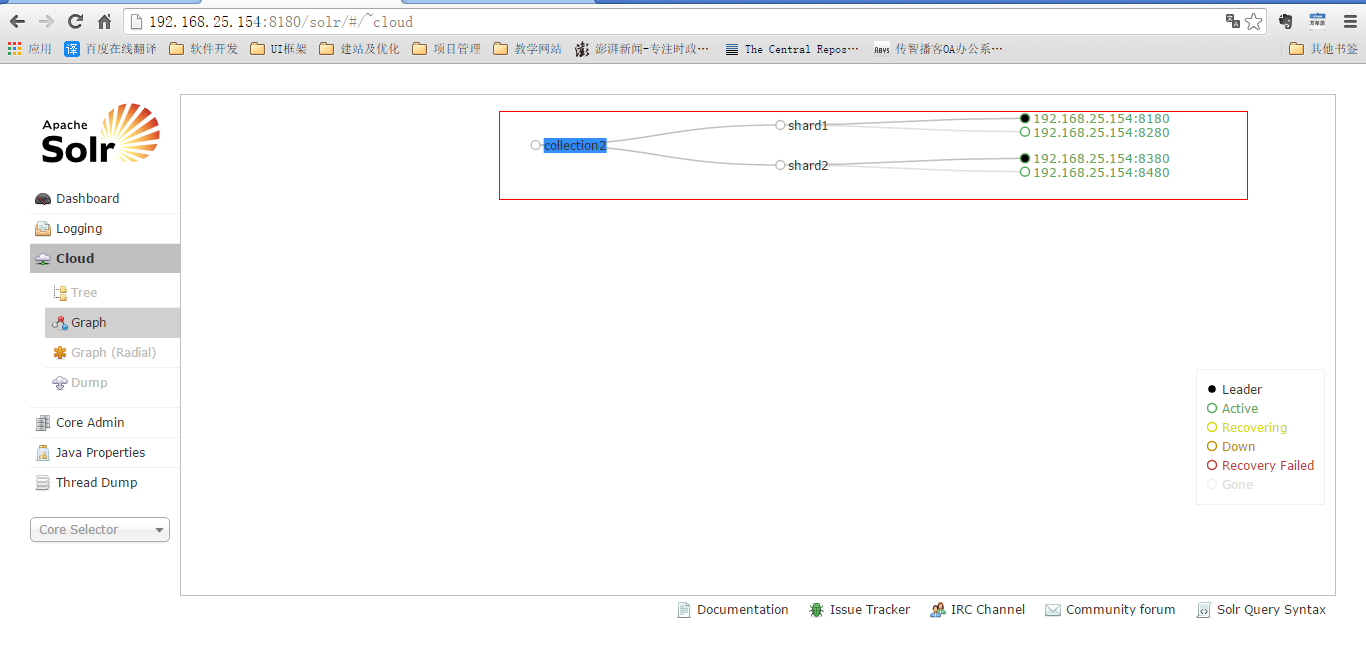
6. 使用solrJ管理集群
6.1. 添加文档
使用步骤:
第一步:把solrJ相关的jar包添加到工程中。
第二步:创建一个SolrServer对象,需要使用CloudSolrServer子类。构造方法的参数是zookeeper的地址列表。
第三步:需要设置DefaultCollection属性。
第四步:创建一SolrInputDocument对象。
第五步:向文档对象中添加域
第六步:把文档对象写入索引库。
第七步:提交。
@Test public void testSolrCloudAddDocument() throws Exception { // 第一步:把solrJ相关的jar包添加到工程中。 // 第二步:创建一个SolrServer对象,需要使用CloudSolrServer子类。构造方法的参数是zookeeper的地址列表。 //参数是zookeeper的地址列表,使用逗号分隔 CloudSolrServer solrServer = new CloudSolrServer("192.168.25.154:2181,192.168.25.154:2182,192.168.25.154:2183"); // 第三步:需要设置DefaultCollection属性。 solrServer.setDefaultCollection("collection2"); // 第四步:创建一SolrInputDocument对象。 SolrInputDocument document = new SolrInputDocument(); // 第五步:向文档对象中添加域 document.addField("item_title", "测试商品"); document.addField("item_price", "100"); document.addField("id", "test001"); // 第六步:把文档对象写入索引库。 solrServer.add(document); // 第七步:提交。 solrServer.commit(); }
6.2. 查询文档
创建一个CloudSolrServer对象,其他处理和单机版一致。
7. 把搜索功能切换到集群版
利用策略设计模式,基于接口编程,dao层在操作和维护索引库的时候使用父类SolrServer,根据配置文件,pring @autowired注解会按照类型自动注入对应的SolrServer对象,以实现单机版和集群版的切换。
<?xml version="1.0" encoding="UTF-8"?> <beans xmlns="http://www.springframework.org/schema/beans" xmlns:context="http://www.springframework.org/schema/context" xmlns:p="http://www.springframework.org/schema/p" xmlns:aop="http://www.springframework.org/schema/aop" xmlns:tx="http://www.springframework.org/schema/tx" xmlns:xsi="http://www.w3.org/2001/XMLSchema-instance" xsi:schemaLocation="http://www.springframework.org/schema/beans http://www.springframework.org/schema/beans/spring-beans4.2.xsd http://www.springframework.org/schema/context http://www.springframework.org/schema/context/spring-context4.2.xsd http://www.springframework.org/schema/aop http://www.springframework.org/schema/aop/spring-aop4.2.xsd http://www.springframework.org/schema/tx http://www.springframework.org/schema/tx/spring-tx4.2.xsd http://www.springframework.org/schema/util http://www.springframework.org/schema/util/spring-util4.2.xsd"> <!-- 单机版solr服务配置 --> <!-- <bean id="httpSolrServer" class="org.apache.solr.client.solrj.impl.HttpSolrServer"> <constructor-arg name="baseURL" value="http://192.168.25.154:8080/solr"></constructor-arg> </bean> --> <!-- 集群版solr服务 --> <bean id="cloudSolrServer" class="org.apache.solr.client.solrj.impl.CloudSolrServer"> <constructor-arg name="zkHost" value="192.168.25.154:2181,192.168.25.154:2182,192.168.25.154:2183"></constructor-arg> <property name="defaultCollection" value="collection2"></property> </bean> </beans>